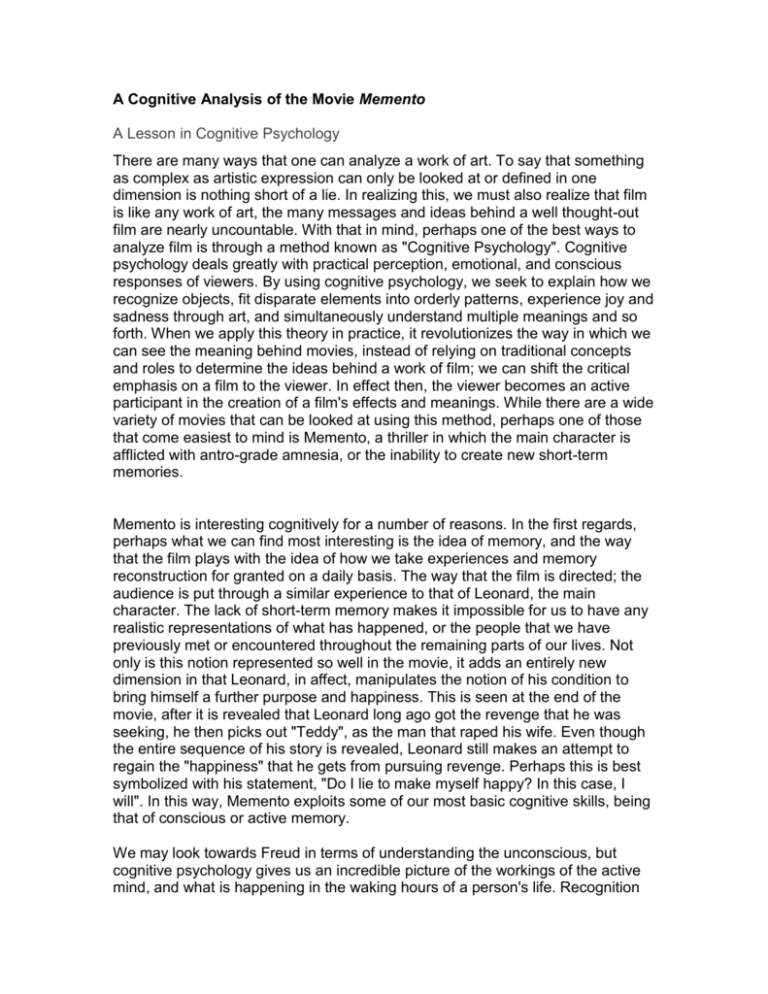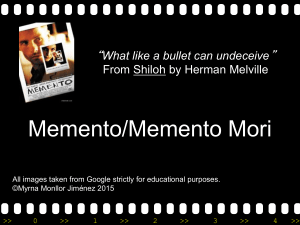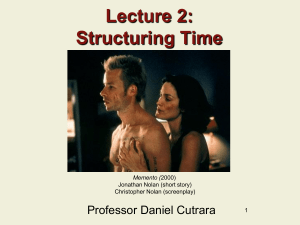Memento: A Cognitive Psychology Analysis
advertisement

A Cognitive Analysis of the Movie Memento A Lesson in Cognitive Psychology There are many ways that one can analyze a work of art. To say that something as complex as artistic expression can only be looked at or defined in one dimension is nothing short of a lie. In realizing this, we must also realize that film is like any work of art, the many messages and ideas behind a well thought-out film are nearly uncountable. With that in mind, perhaps one of the best ways to analyze film is through a method known as "Cognitive Psychology". Cognitive psychology deals greatly with practical perception, emotional, and conscious responses of viewers. By using cognitive psychology, we seek to explain how we recognize objects, fit disparate elements into orderly patterns, experience joy and sadness through art, and simultaneously understand multiple meanings and so forth. When we apply this theory in practice, it revolutionizes the way in which we can see the meaning behind movies, instead of relying on traditional concepts and roles to determine the ideas behind a work of film; we can shift the critical emphasis on a film to the viewer. In effect then, the viewer becomes an active participant in the creation of a film's effects and meanings. While there are a wide variety of movies that can be looked at using this method, perhaps one of those that come easiest to mind is Memento, a thriller in which the main character is afflicted with antro-grade amnesia, or the inability to create new short-term memories. Memento is interesting cognitively for a number of reasons. In the first regards, perhaps what we can find most interesting is the idea of memory, and the way that the film plays with the idea of how we take experiences and memory reconstruction for granted on a daily basis. The way that the film is directed; the audience is put through a similar experience to that of Leonard, the main character. The lack of short-term memory makes it impossible for us to have any realistic representations of what has happened, or the people that we have previously met or encountered throughout the remaining parts of our lives. Not only is this notion represented so well in the movie, it adds an entirely new dimension in that Leonard, in affect, manipulates the notion of his condition to bring himself a further purpose and happiness. This is seen at the end of the movie, after it is revealed that Leonard long ago got the revenge that he was seeking, he then picks out "Teddy", as the man that raped his wife. Even though the entire sequence of his story is revealed, Leonard still makes an attempt to regain the "happiness" that he gets from pursuing revenge. Perhaps this is best symbolized with his statement, "Do I lie to make myself happy? In this case, I will". In this way, Memento exploits some of our most basic cognitive skills, being that of conscious or active memory. We may look towards Freud in terms of understanding the unconscious, but cognitive psychology gives us an incredible picture of the workings of the active mind, and what is happening in the waking hours of a person's life. Recognition of any kind, such as that which is given by memory, is a habituated process that comes about, as we are busy or engaged in other activities. This, then, perfectly fits into the constructions of memory that Leonard sets up for himself. He repeatedly tells himself the story of Sammy Jankis, helping to reconstruct his thoughts on a momentary basis. The importance of the Sammy Jankis story is made incredibly clear by the fact that Leonard has it tattooed on his hand. Leonard repeatedly habituates himself with the memories and stories that we wishes to recreate. This becomes clear to the audience at about the same pace that it occurs to Leonard. While those with antro-grade amnesia are not capable of making new memories, the ability to form physical associations with objects remains perfectly in tact. This becomes a major part of the Sammy Jankis story, and it is the primary reason that Leonard believes Sammy was "faking" his condition, or at least that he should have been physically capable of making new memories. However, the audience finds out at the conclusion of the movie that it was actually Leonard who killed his wife, masking this event by both the Sammy Jankis story and the tattoo that reads, "John G raped and killed my wife". Memento exploits the notion and idea of amnesia by attempting to recreate the situation for the audience. The movie is shot in such a way that keeps the audience unaware of the events that happened first, starting, in fact, with the conclusion of the movie and leading up to the events that began the story. Our very idea of what was going on in the movie, or the motives that were supposed to justify Leonard's actions are shattered at the end of the movie, forcing the audience to then do an active re-evaluation of all the previous actions. Memento results in a high degree of cognitive dissonance with the audience, a major idea behind cognitive psychology. The film entirely complicates our normal way of viewing plot structure and character development. In fact, we have no idea what Leonard is really like, all we are given are the isolated actions of a man, who, in all reality, has no sense of the present or future. The fact that we cannot get an adequate picture of Leonard that we cannot form a sort of expectations or recognition structure for him, is what makes the conclusion of the film so very shocking. The fact that Leonard is a murderer, the idea that he has actually killed his own wife, and the fact that he is actively going to murder Teddy (although that may come down to an idea of impulse) create a large amount of dissonance for the audience. In fact, throughout the movie, there are many times that the audience is led into doubt or confusion regarding some of the events. An early example of this can be seen when Leonard attacks Natalie, who later blames the event on a man named "Dod", one of the junkies who bought from her boyfriend. We become increasingly aware throughout the movie that Leonard has structured many stories for himself, perhaps in an attempt to gain some sort of recognition about the world, or about the current situation he is in. He has found a way to justify the car that he drives, the clothes that he wears, and the actions that he takes. However, as revealed at the conclusion of the film, we also find out that even vengeance did not bring Leonard the happiness that he expected it to. The profiles that we are given of nearly every major character in the film also speak directly of cognitive psychology. The fat that Leonard has to adapt and create a new story for himself and those around him every couple minutes of his life explores a deep component of the nature of what we normally tend to think of as cognitive behavior. Every single morning when we wake up, we have a select few seconds where we are able to recreate ourselves and the events of the previous day or time period before sleeping. In order to understand the condition of Leonard, we must picture that every few minutes would be similar to waking up from a deep sleep. In fact, it becomes nearly impossible to experience the world with what we tend to think of as normal cognition or conscious for one such as Leonard. However, Memento also plays into this notion with the way that the movie seems to be filmed. The audience is constantly treated to close up shots of the faces of the main characters, allowing us, like Leonard, to perhaps come to understand reality solely through the immediate reactions of others. Leonard even mentions this point briefly, when he says that a person "learns" to fake what is going on around them, they learn to smile or react a certain way to certain situations. This reaction is also what is expected of the audience, the idea is there that the audience should be able to reconstruct the story at the same pace and style as does Leonard, affectively toying with the notion of what it really means to be conscious, and how we actually use cognition and reality in our daily lives. Of course, each and every person recreates his or her own stories and events to a certain extent. We tell ourselves stories and create narratives that come to define who we are, what we want to accomplish, and the many important parts of our life. Of course, based on what we want to appear as to the world, these stories are also subject to change. Memory reconstruction, as much as memory retention is a major part of life. Perhaps it is the idea of recreated memories, and changing narratives that allows Memento to hit as hard as it does. We all lie to ourselves to a certain degree, but some would argue that is these lies, which allow us to be so adaptable, and allow us to function the way that we do in society. Memento is a great work of art in film for a number of reasons. However, although much can be gained from the movie, perhaps it is the notion of how exactly the movie plays with the idea of consciousness and memory, as well as what we can gain from analyzing it from the point of cognitive psychology that makes it so valuable. If nothing else, Memento gives us a much greater idea of what it means to use our memories, and what life would be like without the ability to form new memories or create new realities on a constantly changing basis, skills that we use nearly every second of our lives. Although the idea of social construction of the self and psyche has been of immense historical importance, it has taken the forefront in the contemporary search for psyche.








